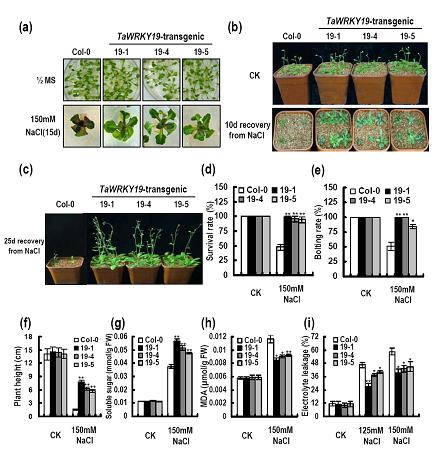-
Wheat WRKY2 and WRKY19 Improve Stress Tolerance in Transgenic Plants
TIME: 19 Jan 2012WRKY-type transcription factors are involved in multiple aspects of plant growth, development and stress response. WRKY genes have been found to be responsive to abiotic stresses; however, their roles in abiotic stress tolerance are largely unknown especially in crops.
Scientists from three groups (Prof Shou-Yi Chen, Prof Jin-Song Zhang and Prof Zheng-Bin Zhang) in Institute of Genetics and Developmental Biology, Chinese Academy of Sciences have focused on analysis of wheat WRKY genes. They identified stress-responsive WRKY genes from wheat (Triticum aestivum L.)and studied their functions in stress tolerance. Forty-three putative TaWRKY genes were identified and two multiple stress-induced genes TaWRKY2 and TaWRKY19 were further characterized. TaWRKY2 and TaWRKY19 are nuclear proteins, and displayed specific binding to typical cis-element W-box. Transgenic Arabidopsis plants overexpressing TaWRKY2 exhibited salt and drought tolerance compared to controls. Overexpression of TaWRKY19 conferred tolerance to salt, drought and freezing stresses in transgenic plants (Figure 1). TaWRKY2 enhanced expressions of STZ and RD29B, and bound to their promoters. TaWRKY19 activated expressions of DREB2A, RD29A, RD29B and Cor6.6, and bound to DREB2A and Cor6.6 promoters. The two TaWRKY proteins may regulate the downstream genes through direct binding to the gene promoter or via indirect mechanism. Manipulation of TaWRKY2 and TaWRKY19 in wheat or other crops should improve their performance under various abiotic stress conditions.
The above work has been published online in Plant, Cell & Environment (doi: 10.1111/j.1365-3040.2012.02480.x.) with Dr. Can-Fang Niu as the first author. This study is supported by grants from 973 project, CAS project and National Transgenic Research Project.
Author contact:
Shou-Yi Chen, sychen@genetics.ac.cn
Jin-Song Zhang, jszhang@genetics.ac.cn
Zheng-Bin Zhang, zzb@sjziam.ac.cn

(Image by Canfang Niu, et al)
Figure 1. Performance of TaWRKY19-transgenic plants under salt stress. (a) Phenotypic comparison under salt stress. (b) Plant growth after 10-d recovery from salt stress. (c) Plant growth after 25-d recovery from salt stress. (d)Survival rate after recovery for 10 d. (e) Bolting rate after 25-d recovery. (f) Plant heights after 25-d recovery. (g) Soluble sugar contents in plants. (h) MDA contents in plants. (i) Relative electrolyte leakage in plant leaves.Asterisks indicate significant differencescompared to Col-0 (*P<0.05; **P<0.01).
 CAS
CAS
 中文
中文




.png)
